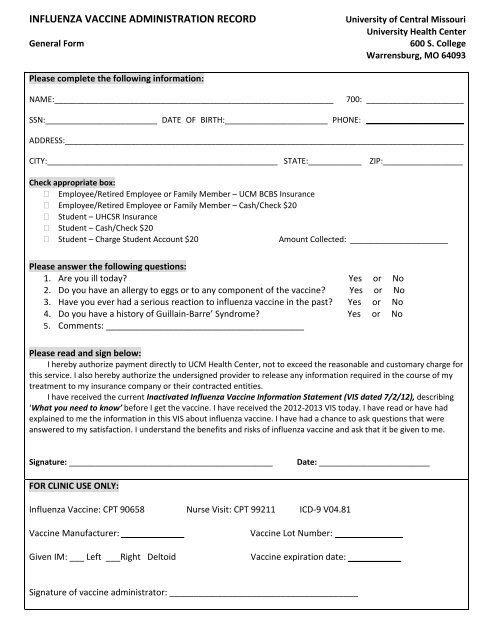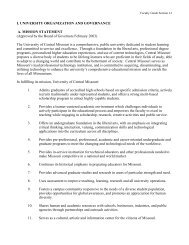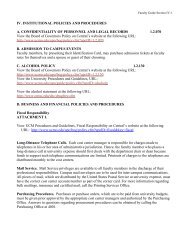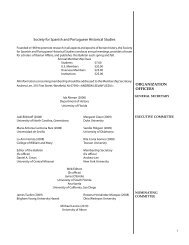influenza vaccine administration record - University of Central Missouri
influenza vaccine administration record - University of Central Missouri
influenza vaccine administration record - University of Central Missouri
Create successful ePaper yourself
Turn your PDF publications into a flip-book with our unique Google optimized e-Paper software.
INFLUENZA VACCINE ADMINISTRATION RECORD<br />
General Form<br />
<strong>University</strong> <strong>of</strong> <strong>Central</strong> <strong>Missouri</strong><br />
<strong>University</strong> Health Center<br />
600 S. College<br />
Warrensburg, MO 64093<br />
Please complete the following information:<br />
NAME:_______________________________________________________________<br />
700: ______________________<br />
SSN:_________________________ DATE OF BIRTH:_______________________ PHONE: ______________________<br />
ADDRESS:__________________________________________________________________________________________<br />
CITY:____________________________________________________ STATE:____________<br />
ZIP:__________________<br />
Check appropriate box:<br />
Employee/Retired Employee or Family Member – UCM BCBS Insurance<br />
Employee/Retired Employee or Family Member – Cash/Check $20<br />
Student – UHCSR Insurance<br />
Student – Cash/Check $20<br />
Student – Charge Student Account $20<br />
Amount Collected: ______________________<br />
Please answer the following questions:<br />
1. Are you ill today? Yes or No<br />
2. Do you have an allergy to eggs or to any component <strong>of</strong> the <strong>vaccine</strong>? Yes or No<br />
3. Have you ever had a serious reaction to <strong>influenza</strong> <strong>vaccine</strong> in the past? Yes or No<br />
4. Do you have a history <strong>of</strong> Guillain-Barre’ Syndrome? Yes or No<br />
5. Comments: _________________________________________<br />
Please read and sign below:<br />
I hereby authorize payment directly to UCM Health Center, not to exceed the reasonable and customary charge for<br />
this service. I also hereby authorize the undersigned provider to release any information required in the course <strong>of</strong> my<br />
treatment to my insurance company or their contracted entities.<br />
I have received the current Inactivated Influenza Vaccine Information Statement (VIS dated 7/2/12), describing<br />
‘What you need to know’ before I get the <strong>vaccine</strong>. I have received the 2012-2013 VIS today. I have read or have had<br />
explained to me the information in this VIS about <strong>influenza</strong> <strong>vaccine</strong>. I have had a chance to ask questions that were<br />
answered to my satisfaction. I understand the benefits and risks <strong>of</strong> <strong>influenza</strong> <strong>vaccine</strong> and ask that it be given to me.<br />
Signature: ______________________________________________<br />
Date: _________________________<br />
FOR CLINIC USE ONLY:<br />
Influenza Vaccine: CPT 90658 Nurse Visit: CPT 99211 ICD-9 V04.81<br />
Vaccine Manufacturer: _____________<br />
Given IM: ___ Left ___Right Deltoid<br />
Vaccine Lot Number: ______________<br />
Vaccine expiration date: ___________<br />
Signature <strong>of</strong> <strong>vaccine</strong> administrator: _______________________________________
Influenza Vaccine<br />
Inactivated<br />
What You Need to Know<br />
1<br />
Why get vaccinated?<br />
Influenza (“flu”) is a contagious disease.<br />
It is caused by the <strong>influenza</strong> virus, which can be spread<br />
by coughing, sneezing, or nasal secretions.<br />
Anyone can get <strong>influenza</strong>, but rates <strong>of</strong> infection are<br />
highest among children. For most people, symptoms last<br />
only a few days. They include:<br />
• fever/chills • sore throat • muscle aches • fatigue<br />
• cough • headache • runny or stuffy nose<br />
Other illnesses can have the same symptoms and are<br />
<strong>of</strong>ten mistaken for <strong>influenza</strong>.<br />
Young children, people 65 and older, pregnant women,<br />
and people with certain health conditions – such as heart,<br />
lung or kidney disease, or a weakened immune system –<br />
can get much sicker. Flu can cause high fever and<br />
pneumonia, and make existing medical conditions worse.<br />
It can cause diarrhea and seizures in children. Each year<br />
thousands <strong>of</strong> people die from <strong>influenza</strong> and even more<br />
require hospitalization.<br />
By getting flu <strong>vaccine</strong> you can protect yourself from<br />
<strong>influenza</strong> and may also avoid spreading <strong>influenza</strong> to<br />
others.<br />
2<br />
Inactivated <strong>influenza</strong> <strong>vaccine</strong><br />
There are two types <strong>of</strong> <strong>influenza</strong> <strong>vaccine</strong>:<br />
1. Inactivated (killed) <strong>vaccine</strong>, the “flu shot,” is given<br />
by injection with a needle.<br />
2. Live, attenuated (weakened) <strong>influenza</strong> <strong>vaccine</strong> is<br />
sprayed into the nostrils. This <strong>vaccine</strong> is described in a<br />
separate Vaccine Information Statement.<br />
A “high-dose” inactivated <strong>influenza</strong> <strong>vaccine</strong> is available<br />
for people 65 years <strong>of</strong> age and older. Ask your doctor for<br />
more information.<br />
Influenza viruses are always changing, so annual<br />
vaccination is recommended. Each year scientists try to<br />
match the viruses in the <strong>vaccine</strong> to those most likely to<br />
cause flu that year. Flu <strong>vaccine</strong> will not prevent disease<br />
from other viruses, including flu viruses not contained in<br />
the <strong>vaccine</strong>.<br />
It takes up to 2 weeks for protection to develop after the<br />
shot. Protection lasts about a year.<br />
VACCINE INFORMATION STATEMENT<br />
2012 - 2013<br />
Many Vaccine Information Statements are available in Spanish and other languages. <br />
See www.immunize.org/vis.<br />
Hojas de Informacián Sobre Vacunas están disponibles en Español y en <br />
muchos otros idiomas. Visite http://www.immunize.org/vis<br />
Some inactivated <strong>influenza</strong> <strong>vaccine</strong> contains a preservative<br />
called thimerosal. Thimerosal-free <strong>influenza</strong> <strong>vaccine</strong> is<br />
available. Ask your doctor for more information.<br />
3<br />
WHO<br />
Who should get inactivated<br />
<strong>influenza</strong> <strong>vaccine</strong> and when?<br />
All people 6 months <strong>of</strong> age and older should get flu<br />
<strong>vaccine</strong>.<br />
Vaccination is especially important for people at higher<br />
risk <strong>of</strong> severe <strong>influenza</strong> and their close contacts,<br />
including healthcare personnel and close contacts <strong>of</strong><br />
children younger than 6 months.<br />
WHEN<br />
Get the <strong>vaccine</strong> as soon as it is available. This should<br />
provide protection if the flu season comes early. You can<br />
get the <strong>vaccine</strong> as long as illness is occurring in your<br />
community.<br />
Influenza can occur at any time, but most <strong>influenza</strong><br />
occurs from October through May. In recent seasons,<br />
most infections have occurred in January and February.<br />
Getting vaccinated in December, or even later, will still<br />
be beneficial in most years.<br />
Adults and older children need one dose <strong>of</strong> <strong>influenza</strong><br />
<strong>vaccine</strong> each year. But some children younger than 9<br />
years <strong>of</strong> age need two doses to be protected. Ask your<br />
doctor.<br />
Influenza <strong>vaccine</strong> may be given at the same time as other<br />
<strong>vaccine</strong>s, including pneumococcal <strong>vaccine</strong>.<br />
4<br />
Some people should not get<br />
inactivated <strong>influenza</strong> <strong>vaccine</strong><br />
or should wait.<br />
• Tell your doctor if you have any severe (lifethreatening)<br />
allergies, including a severe allergy to<br />
eggs. A severe allergy to any <strong>vaccine</strong> component may<br />
be a reason not to get the <strong>vaccine</strong>. Allergic reactions to<br />
<strong>influenza</strong> <strong>vaccine</strong> are rare.
• Tell your doctor if you ever had a severe reaction after<br />
a dose <strong>of</strong> <strong>influenza</strong> <strong>vaccine</strong>.<br />
• Tell your doctor if you ever had Guillain-Barré<br />
Syndrome (a severe paralytic illness, also called GBS).<br />
Your doctor will help you decide whether the <strong>vaccine</strong><br />
is recommended for you.<br />
• People who are moderately or severely ill should usually<br />
wait until they recover before getting flu <strong>vaccine</strong>. If you are<br />
ill, talk to your doctor about whether to reschedule the<br />
vaccination. People with a mild illness can usually get the<br />
<strong>vaccine</strong>.<br />
5<br />
What are the risks from<br />
inactivated <strong>influenza</strong> <strong>vaccine</strong>?<br />
A <strong>vaccine</strong>, like any medicine, could possibly cause<br />
serious problems, such as severe allergic reactions. The<br />
risk <strong>of</strong> a <strong>vaccine</strong> causing serious harm, or death, is<br />
extremely small.<br />
Serious problems from inactivated <strong>influenza</strong> <strong>vaccine</strong> are<br />
very rare. The viruses in inactivated <strong>influenza</strong> <strong>vaccine</strong><br />
have been killed, so you cannot get <strong>influenza</strong> from the<br />
<strong>vaccine</strong>.<br />
Mild problems:<br />
• soreness, redness, or swelling where the shot was given<br />
• hoarseness; sore, red or itchy eyes; cough<br />
• fever • aches • headache • itching • fatigue<br />
If these problems occur, they usually begin soon after the<br />
shot and last 1-2 days.<br />
Moderate problems:<br />
Young children who get inactivated flu <strong>vaccine</strong> and<br />
pneumococcal <strong>vaccine</strong> (PCV13) at the same time appear<br />
to be at increased risk for seizures caused by fever. Ask<br />
your doctor for more information.<br />
Tell your doctor if a child who is getting flu <strong>vaccine</strong> has<br />
ever had a seizure.<br />
Severe problems:<br />
• Life-threatening allergic reactions from <strong>vaccine</strong>s are<br />
very rare. If they do occur, it is usually within a few<br />
minutes to a few hours after the shot.<br />
• In 1976, a type <strong>of</strong> inactivated <strong>influenza</strong> (swine flu)<br />
<strong>vaccine</strong> was associated with Guillain-Barré Syndrome<br />
(GBS). Since then, flu <strong>vaccine</strong>s have not been clearly<br />
linked to GBS. However, if there is a risk <strong>of</strong> GBS<br />
from current flu <strong>vaccine</strong>s, it would be no more than 1<br />
or 2 cases per million people vaccinated. This is much<br />
lower than the risk <strong>of</strong> severe <strong>influenza</strong>, which can be<br />
prevented by vaccination.<br />
The safety <strong>of</strong> <strong>vaccine</strong>s is always being monitored. For<br />
more information, visit:<br />
www.cdc.gov/<strong>vaccine</strong>safety/Vaccine_Monitoring/Index.html and<br />
www.cdc.gov/<strong>vaccine</strong>safety/Activities/Activities_Index.html<br />
6<br />
One brand <strong>of</strong> inactivated flu <strong>vaccine</strong>, called Afluria,<br />
should not be given to children 8 years <strong>of</strong> age or<br />
younger, except in special circumstances. A related<br />
<strong>vaccine</strong> was associated with fevers and fever-related<br />
seizures in young children in Australia. Your doctor<br />
can give you more information.<br />
What if there is a severe<br />
reaction?<br />
What should I look for?<br />
• Any unusual condition, such as a high fever or unusual<br />
behavior. Signs <strong>of</strong> a serious allergic reaction can include<br />
difficulty breathing, hoarseness or wheezing, hives,<br />
paleness, weakness, a fast heart beat or dizziness.<br />
What should I do?<br />
• Call a doctor, or get the person to a doctor right away.<br />
• Tell your doctor what happened, the date and time it<br />
happened, and when the vaccination was given.<br />
• Ask your doctor, nurse, or health department to report<br />
the reaction by filing a Vaccine Adverse Event<br />
Reporting System (VAERS) form. Or you can file this<br />
report through the VAERS web site at<br />
www.vaers.hhs.gov, or by calling 1-800-822-7967.<br />
VAERS does not provide medical advice.<br />
7<br />
The National Vaccine Injury<br />
Compensation Program<br />
The National Vaccine Injury Compensation Program<br />
(VICP) was created in 1986.<br />
People who believe they may have been injured by a<br />
<strong>vaccine</strong> can learn about the program and about filing a<br />
claim by calling 1-800-338-2382 or visiting the VICP<br />
website at www.hrsa.gov/<strong>vaccine</strong>compensation.<br />
8<br />
How can I learn more?<br />
• Ask your doctor. They can give you the <strong>vaccine</strong><br />
package insert or suggest other sources <strong>of</strong> information.<br />
• Call your local or state health department.<br />
• Contact the Centers for Disease Control and<br />
Prevention (CDC):<br />
- Call 1-800-232-4636 (1-800-CDC-INFO) or<br />
- Visit CDC’s website at www.cdc.gov/flu<br />
Vaccine Information Statement (Interim)<br />
Influenza Vaccine<br />
(Inactivated)<br />
7/2/2012<br />
42 U.S.C. § 300aa-26<br />
Office Use<br />
Only

















